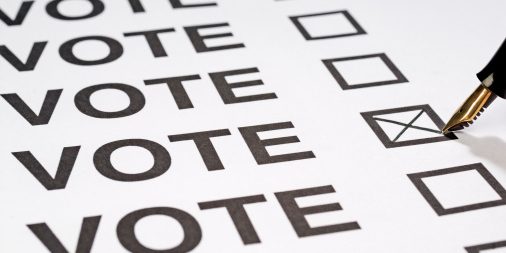Starting in 2024, New York will implement new language requirements for state ballot questions. On Nov. 17, 2023, Gov. Kathy Hochul (D) signed Senate Bill 1381 (SB 1381), which requires state ballot measure questions to be written using clear language and not exceed an eighth-grade reading level. In the Legislature, SB 1381 received a unanimous vote in each chamber, excluding absent members.
New York is the second state to enact legislation regarding how readable ballot measure language is for voters in 2023. In March, North Dakota passed a bill requiring summaries of ballot measures to be written in “plain, clear, understandable language using words with common, everyday meaning.” In 2019, Maine passed a law requiring ballot questions to be written as simple as possible. While the three laws required the use of plain or simple language, New York SB 1381 also included a specific grade-level requirement based on an index called the Automated Readability Index. SB 1381 also defined the phrase “plain language” as “easily comprehended, concise language” that does not include semicolons, double negatives, or more than one passive sentence. In Maine and North Dakota, the laws did not provide specific definitions or grade-level requirements.
State Sen. Leroy Comrie (D-14), the lead sponsor of SB 1381, wrote, “If voters cannot understand the text—or the implications of the question—they cannot participate effectively. The solution is writing ballot questions in plain language.” In North Dakota, Rep. Jorin Johnson (R-41) said, “Plain language is a way of writing that uses smaller words and shorter sentences. This helps people understand the main ideas more clearly without inflated vocabulary and convoluted sentence construction.” Unlike New York, there were votes against the legislation in North Dakota, with 79% of the legislators voting to pass the bill and 21% voting against the bill. Sen. Judy Lee (R-13), who voted against the bill, said, “As one of our people who testified said, ’It’s a noble goal, but ‘readable’ is in the eye of the beholder.’ … There are no definitions for some of the words used in the bill like ‘common everyday meaning’… It’s just extremely hard to define.”
The next ballot measure election in New York is scheduled for the general election on Nov. 5, 2024. Voters will decide on at least one constitutional amendment. The ballot measure would amend the state’s Bill of Rights to provide that people cannot be denied rights based on “ethnicity, national origin, age, and disability” or “sex, including sexual orientation, gender identity, gender expression, pregnancy, pregnancy outcomes, and reproductive healthcare and autonomy.”
In 2023, there were two constitutional amendments on the ballot in New York. These amendments had readability scores equivalent to 11th-grade and 12th-grade reading levels. Since 2017, there have been 11 state ballot measures in New York, with an average readability score of 14, which is similar to an undergraduate level of education. In 2023, the average score across the states was 19, which is similar to a graduate school reading level.
In 2023, at least 44 pieces of legislation related to ballot measures have been enacted into law. Since 2018, 204 bills related to ballot measures have been enacted, with an annual average of 34. The count in 2023 ties with the count in 2019, when 44 bills were also adopted.
Additional:


